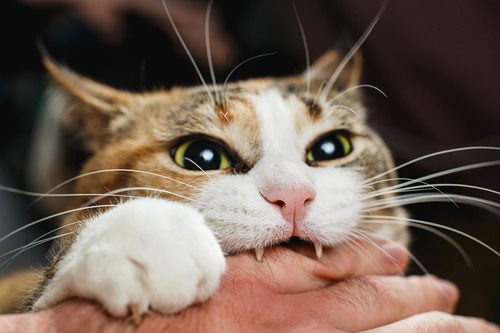Why is My Cat Suddenly Aggressive

If you’ve noticed your usually calm and affectionate cat becoming aggressive, you might be wondering what triggered the abrupt personality change. Sudden aggression in cats is a change in behavior that can signal stress, medical issues, or environmental triggers. While cats can display aggression for a variety of reasons, the key factor is that this behavior is new or unusual for your pet. Understanding why a cat becomes aggressive can help you address the underlying cause and ensure both your cat’s safety and the safety of those around them. At Trinity Veterinary Hospital in Stillwater, OK, we emphasize that any sudden or unusual aggression in cats should be evaluated by your veterinarian to rule out health concerns and guide behavioral interventions safely.
Why Female Cats Suddenly Become Aggressive
Female cats may become aggressive for several reasons, and this behavior can appear suddenly even in cats who have always been friendly. Hormonal changes are a common trigger, especially in unspayed females. Heat cycles, ovarian cysts, or other reproductive system changes can increase irritability and trigger aggressive behaviors. Stress and environmental changes can also contribute. Cats are territorial by nature, and disruptions like moving furniture, introducing new household members, or changes in routine can provoke aggression. Pain or illness is another critical factor; conditions such as arthritis, dental disease, or urinary tract infections may cause your cat to lash out when handled. Observing the context of aggression, such as whether it occurs during handling, around food, or in specific areas of the home, can provide important clues for your veterinarian.

Key Factors Behind Female Cat Aggression
- Hormonal influences: heat cycles or reproductive system issues
- Pain or illness: dental disease, arthritis, or infections
- Environmental stress: changes in the home or routine
- Territoriality: defending space or resources from perceived threats
If your female cat’s aggression is sudden or escalating, contact Trinity Veterinary Hospital at (405) 533-0001 to schedule a comprehensive examination. Identifying the root cause early is essential to protect both your cat and those around her.
Why is My Cat Suddenly Aggressive Towards My Other Cat
Inter-cat aggression is a common issue in multi-cat households, and it often appears suddenly. A previously harmonious pair may begin fighting due to illness, stress, or changes in their environment. One cat may become aggressive if they feel their territory is threatened, if there is a new addition to the home, or if routine changes disrupt established hierarchies. Health problems in one cat, such as pain, hormonal imbalances, or neurological issues, can also trigger aggression toward another cat. Sometimes, aggression stems from redirected frustration, where a cat cannot reach the source of their irritation and takes it out on another household cat.

Types of Inter-Cat Aggression
- Territorial aggression: defending specific areas, toys, or sleeping spots
- Redirected aggression: targeting another cat when stressed by a separate trigger
- Fear-based aggression: triggered by sudden noises, new people, or unfamiliar cats
- Pain-induced aggression: illness or discomfort causing irritability
Understanding the context of aggression is essential. If your cats are suddenly aggressive toward each other, a veterinary evaluation is crucial to determine whether the behavior is medical, environmental, or behavioral. Trinity Veterinary Hospital can provide guidance, behavioral support, and health assessments to restore harmony safely in your home.
Other Causes of Sudden Aggression in Cats
Beyond female-specific or inter-cat aggression, several other factors can lead a cat to become suddenly aggressive. Pain or illness is one of the most common underlying causes. Even minor discomfort from dental disease, gastrointestinal issues, urinary tract problems, or musculoskeletal pain can provoke aggression. Anxiety, fear, or stress can also trigger aggressive behavior; new people, loud noises, or household changes can all contribute. Cognitive dysfunction in older cats may lead to sudden irritability or aggression. Environmental triggers, such as access to the outdoors or changes in territory, can also play a role. Recognizing patterns in your cat’s aggression, including time of day, location, or interactions, can help your veterinarian pinpoint the cause.

When to Seek Help
- Aggression is new or escalating
- Aggression is paired with other signs of illness, such as lethargy, vomiting, or changes in appetite
- Aggression is causing injury to humans or other pets
- You notice behavioral changes that persist over time
Contact Trinity Veterinary Hospital at (405) 533-0001 if your cat displays sudden aggression. Early evaluation ensures your cat receives the care needed for both physical and behavioral health.
Observing and Documenting Aggression
One of the most effective steps you can take as a pet owner is to carefully observe and document your cat’s aggressive behavior. Note when the aggression occurs, the triggers, and the cat’s body language during these incidents. Look for signs such as flattened ears, dilated pupils, twitching tails, hissing, or growling. Keeping a record of these incidents will help your veterinarian identify patterns and underlying causes. Video recordings can also be helpful, as they provide a clear picture of your cat’s behavior in real time. Understanding your cat’s aggression patterns enables more accurate assessment and targeted interventions.
Understanding Your Cat’s Aggression and Seeking Help
A cat suddenly becoming aggressive can be alarming for any pet owner, but it’s important to remember that this behavior is a signal from your cat that something is wrong, whether it’s health-related, environmental, or stress-induced. Monitoring your cat, documenting aggressive episodes, and seeking professional evaluation are essential steps in protecting both your cat and your household. At Trinity Veterinary Hospital in Stillwater, OK, we are experienced in evaluating sudden aggression in cats and providing compassionate, comprehensive care. Don’t wait, but call us at (405) 533-0001 to schedule an appointment or discuss your cat’s behavior with one of our veterinarians. By addressing the issue early, you can help your cat return to a calm, comfortable, and safe state while ensuring the well-being of your entire household.
Recent Posts
About Us
For over a decade, Trinity Veterinary Hospital has provided compassionate, faith-based care to pets in our college town and beyond. We treat every pet like family, offering routine checkups, boarding, and advanced care from a board-certified internist.
